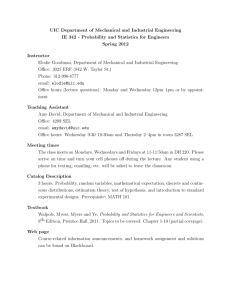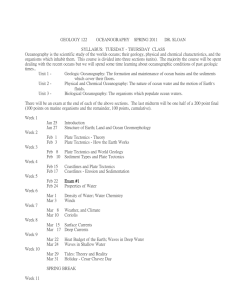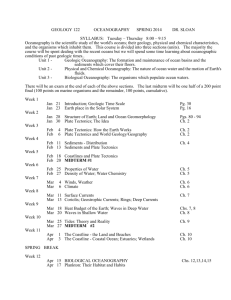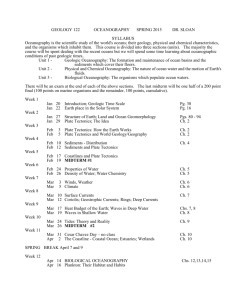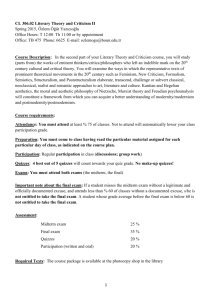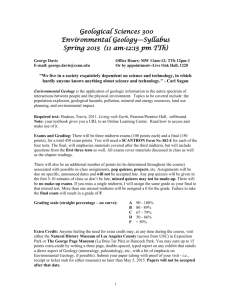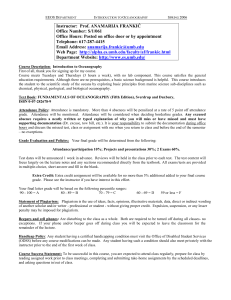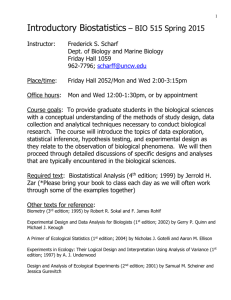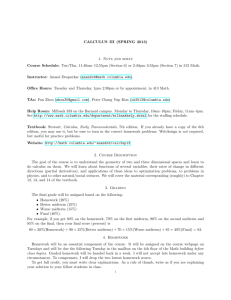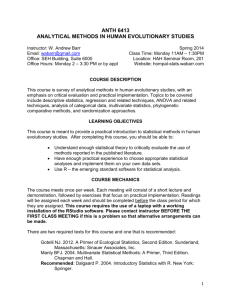Geological Sciences 110 * Earth History
advertisement
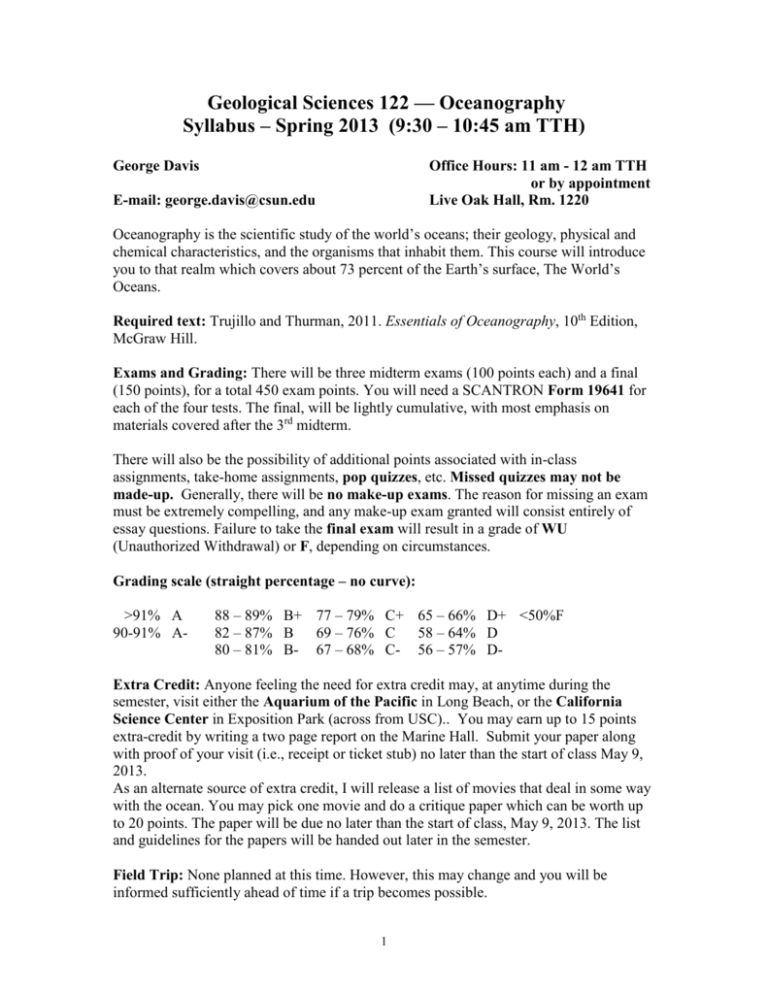
Geological Sciences 122 — Oceanography Syllabus – Spring 2013 (9:30 – 10:45 am TTH) George Davis Office Hours: 11 am - 12 am TTH or by appointment Live Oak Hall, Rm. 1220 E-mail: george.davis@csun.edu Oceanography is the scientific study of the world’s oceans; their geology, physical and chemical characteristics, and the organisms that inhabit them. This course will introduce you to that realm which covers about 73 percent of the Earth’s surface, The World’s Oceans. Required text: Trujillo and Thurman, 2011. Essentials of Oceanography, 10th Edition, McGraw Hill. Exams and Grading: There will be three midterm exams (100 points each) and a final (150 points), for a total 450 exam points. You will need a SCANTRON Form 19641 for each of the four tests. The final, will be lightly cumulative, with most emphasis on materials covered after the 3rd midterm. There will also be the possibility of additional points associated with in-class assignments, take-home assignments, pop quizzes, etc. Missed quizzes may not be made-up. Generally, there will be no make-up exams. The reason for missing an exam must be extremely compelling, and any make-up exam granted will consist entirely of essay questions. Failure to take the final exam will result in a grade of WU (Unauthorized Withdrawal) or F, depending on circumstances. Grading scale (straight percentage – no curve): >91% A 90-91% A- 88 – 89% B+ 77 – 79% C+ 65 – 66% D+ <50%F 82 – 87% B 69 – 76% C 58 – 64% D 80 – 81% B- 67 – 68% C- 56 – 57% D- Extra Credit: Anyone feeling the need for extra credit may, at anytime during the semester, visit either the Aquarium of the Pacific in Long Beach, or the California Science Center in Exposition Park (across from USC).. You may earn up to 15 points extra-credit by writing a two page report on the Marine Hall. Submit your paper along with proof of your visit (i.e., receipt or ticket stub) no later than the start of class May 9, 2013. As an alternate source of extra credit, I will release a list of movies that deal in some way with the ocean. You may pick one movie and do a critique paper which can be worth up to 20 points. The paper will be due no later than the start of class, May 9, 2013. The list and guidelines for the papers will be handed out later in the semester. Field Trip: None planned at this time. However, this may change and you will be informed sufficiently ahead of time if a trip becomes possible. 1 Tips for succeeding in this class (The assumption is made that you wish to succeed) The following must be followed for successful completion of this course: 1. If you do not understand something, please ask questions. 2. Use your Oceanography class time for Oceanography! Take notes for the current session. If you have missed a lecture and need to copy a classmate’s notes, find a photocopying machine — it’s a lot faster than copying by hand. 3. Give yourself time to study. The general consensus is that to do well in a class the average student should spend two hours outside study for each hour spent in class. Only you know if you are average or not and need more or less time. Regardless, review notes as soon as possible after class to fill in unfinished diagrams and partial sentences while they are still fresh in your mind. 4. Historically the first exam is a wake-up call. Pay attention and don’t hit the snooze button if you do not do well on the exam. Ask for help then, not later. 5. Cheating/Plagiarism. DON’T!!! If caught, you will automatically fail the course, and a report will be filed with the Office of the Vice President for Student Affairs and Dean of Students. In short I abide by the CSUN rules on academic cheating. Those rules are on the CSUN website. I suggest you access and read them. 6. Some No’s: No eating in class — bottled water is OK No socializing during class — save social discussions for times outside the classroom No extraneous reading (newspapers, flyers, novels, etc.) in class No electronics (I-pods, CD players, cell phones, etc.) during class No text messaging during class. If seen, you will be asked to leave the class 7. Come to class. Attendance is mandatory. Historically, those who cut the class fail the class. AND be on time. Be prepared to spend the entire time in class. 8. Check your final exam schedules early to determine if there will be any time conflicts that need to be resolved. 2 Course Outline DATE Materials to be covered Relevant Chapters Week 1 – Jan 22 Jan 24 Week 2 – Jan 29 Jan 30 Week 3 – Feb 5 Feb 7 Week 4 – Feb 12 Feb 14 Week 5 – Feb 19 Feb 21 Week 6 - Feb 26 Feb 28 Week 7 - Mar 5 Mar 7 Introduction — Scientific Method Introduction to Planet “Earth” Plate Tectonics (history) Plate Tectonics (functionality) Marine Provinces Marine Provinces Midterm 1 Marine Sediments Earthquakes Water and seawater Water and seawater Air-Sea Interaction Ocean Circulation Midterm 2 Week 8 - Mar 12 Mar 14 Week 9 - Mar 19 Mar 21 Week 10 - Mar 26 Mar 28 Week 11 - Apr 2 Apr 4 Waves and Water Dynamics Tides Tides Coast: Beaches and Shoreline Coastal Ocean Marine Life and the Mar. Environment Marine Life and the Mar. Environment Midterm 3 Week 12 – Apr 9 & 11 Week 13 – Apr 16 Apr 18 Week 14 Apr 23 Apr 25 Week 15 Apr 30 May 2 Week 16 May 7 May 9 Week 17 May 14 Spring Break Biological Productivity Biological Productivity To be announced Animals of the Pelagic Environment Animals of the Pelagic Environment Animals of the Benthic Environment Animals of the Benthic Environment Oceans and Climate Change Final - 8-10 am Room LO 1219 Introduction Ch. 1 Ch. 2 Ch. 2 Ch. 3 Ch. 3 Ch. (In, 1, 2, 3) Ch. 4 Handout Ch. 5 Ch. 5 Ch. 6 Ch. 7 (Ch. HO, 4, 5, 6, 7) Ch. 8 Ch. 9 Ch. 9 Ch. 10 Ch. 11 Ch. 12 Ch. 12 (Ch. 8, 9, 10, 11, 12) Ch. 13 Ch. 13 ??? Ch. 14 Ch. 14 Ch. 15 Ch. 15 Ch. 16 (Ch. 13, 14, 15, 16, ??) With the exception of the “Final Date and Time,” I reserve the right to modify this outline as conditions warrant . 3
